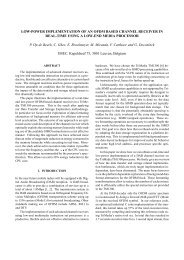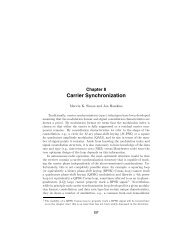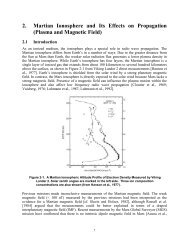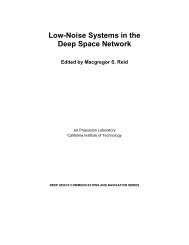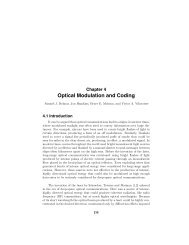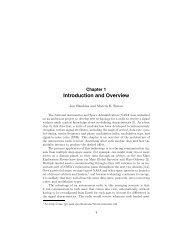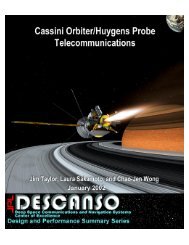Propagation Effects Handbook for Satellite Systems - DESCANSO ...
Propagation Effects Handbook for Satellite Systems - DESCANSO ...
Propagation Effects Handbook for Satellite Systems - DESCANSO ...
You also want an ePaper? Increase the reach of your titles
YUMPU automatically turns print PDFs into web optimized ePapers that Google loves.
D<br />
-<br />
The propagation margin is then computed as follows:<br />
-<br />
Decrease in signal level = 30 + 0.68 = 30.68 dB.<br />
Increase in noise temperature = 10 log[ (279.7 + 300)/300]<br />
= 2.86 dB.<br />
Required propagation margin = 30.68 + 2.86 = 33.54 dB.<br />
For this example<br />
factor in the margin<br />
the signal level decrease is the predominate<br />
requirement.<br />
Note that the reliability criterian plays a significant role in<br />
propagation margins <strong>for</strong> the two above examples (2.22 vs 33.54 dB).<br />
The relative difference in receiver noise temperature, however,<br />
also accounts <strong>for</strong> the greater importance of noise over attenuation<br />
in the first example.<br />
6.8.5 Sky Noise Due to Clouds, Foq, Sand and Dust. The major<br />
contributor to the sky noise temperature is the medium with the<br />
highest attenuation. Generally, clouds will present higher<br />
attenuations than fog, sand or dust. For example, <strong>for</strong> cumulus clouds<br />
with no precipitation the water density will be approximately 0.5<br />
g/m3. For the Rosman example described earlier (20 GHz),<br />
A= KC p, tC CSC e<br />
(6.8-7)<br />
where tc is the thickness of the clouds (typically 2 kilometers).<br />
Using typical numbers<br />
A= (0.4 dBm3/gm km) (0.5 gm/m3) (2 km) csc (47°)<br />
= 0.55 dB<br />
The corresponding sky noise contribution is then<br />
With T mc<br />
Ts = T mc [1 - 10-(0”55/10)]<br />
equal to the temperature of the cloud (i.e., T mc =<br />
6-139




